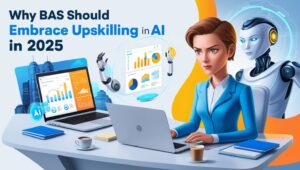In today’s digital-first world, artificial intelligence (AI) and machine learning (ML) are revolutionizing how businesses operate. While coding algorithms may seem like a task for data scientists, understanding these technologies has become a must-have skill for business analysts. It’s not about becoming an AI expert—it’s about leveraging its potential to deliver better business outcomes.
Here’s why AI and ML knowledge should be part of every business analyst’s toolkit:
1️⃣ Propose Smarter Solutions
AI and ML can automate processes, predict trends, and deliver tailored customer experiences. When you understand these technologies, you’re better equipped to identify areas where they can drive efficiency and innovation. From suggesting AI-powered chatbots to implementing predictive analytics, your insights can shape smarter strategies.
2️⃣ Communicate with Technical Teams Effectively
AI projects involve collaboration with data scientists and engineers. By understanding concepts like predictive modeling or supervised learning, you can bridge the gap between stakeholders and technical teams, ensuring AI solutions meet business goals.
3️⃣ Enable Data-Driven Decisions
AI thrives on analyzing data to uncover patterns and trends. When you understand how ML models work, you can interpret their outputs to guide data-driven business decisions with confidence.
4️⃣ Stay Competitive in a Growing Market
With businesses increasingly adopting AI, having foundational knowledge in this area sets you apart in the job market. It demonstrates that you’re forward-thinking and ready to tackle tomorrow’s challenges.
5️⃣ Be the Bridge Between Business and Technology
Your role as a business analyst is to connect stakeholders with technology. Understanding AI enables you to ask the right questions, set realistic expectations, and design solutions that align with strategic goals.
How to Get Started with AI as a Business Analyst
You don’t need to dive into coding to benefit from AI. Focus on:
- Learning the Basics: What is AI? How does ML work?
- Exploring Use Cases: Study AI applications across industries like healthcare, finance, and retail.
- Leveraging Tools: Familiarize yourself with tools like Power BI, Tableau, and automation platforms.
Final Thoughts
AI and machine learning are no longer optional—they’re essential for driving business success. As a business analyst, your ability to understand and apply these technologies makes you a key player in your organization’s digital transformation.
Ready to future-proof your career? Start your journey with AstraTech Careers today!







